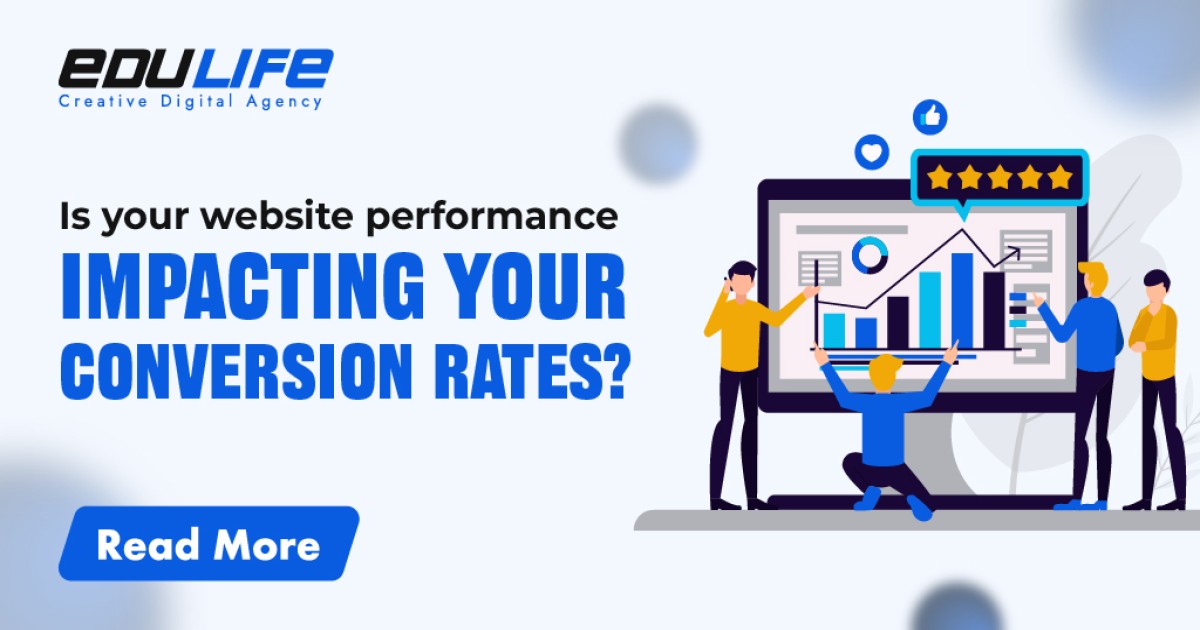
Have you ever been waiting for a website to open after clicking on it and finding yourself looking at a blank screen? You most likely didn't wait long. You simply pushed the return button and went on like most people do. Now, considering that your website has slow loading speeds or slow performance, is it quietly giving potential clients?
A well-designed website should function flawlessly, in addition to being excellent. A few more seconds may cost you trustworthiness, leads and sales in a world where people's attention spans are shorter than ever before while they're online. Getting an understanding of the relationship between your website's performance and conversion rate is now crucial for growth.
The performance of a website is essential to your online presence. It influences how quickly, smoothly and reliably people experience your site from the first minute they click on it. An effective website maintains user engagement, builds trust and naturally inspires users to take action, such as buying something or signing up for a service.
Imagine being unable to do anything but watch a spinning loader when you reach at a website, ready to get what you need. Quite annoying, isn't it? Now, consider the visitors. You face the opportunity of losing them in a matter of seconds if your website is slow to load, responds oddly or lacks consistency.
Page Load Speed: How soon your pages are visible and usable. Happy, more involved visitors are the result of faster pages.
Time to First Byte (TTFB): Your server's response time is measured by its Time to First Byte (TTFB). Making a good first impression requires a fast TTFB.
Core Web Vitals: Examples of Core Web Vitals are Cumulative Layout Shift (CLS), First Input Delay (FID) and Largest Contentful Paint (LCP). Visual stability, loading speed and engagement are some of these measures.
Each person who visits your website has the potential to become a consumer, subscriber or loyal supporter. However, getting traffic isn't enough what counts most is the number of visitors who take action. Your conversion rate indicates how well your website is doing its primary function, which is to convert visitors into results, whether that means making a purchase, subscribing to a newsletter, completing a form or downloading an app.
A high conversion rate means your website is doing more than just focusing on visitors. It is connecting with them, earning their trust and easily directing them to the actions you desire. It is an obvious indication that your design is easy to use, your message is powerful and your performance improves rather than reducing the user journey.
Website performance is closely related to conversion rates. Customers are more likely to spend time on your site, explore and finally convert when it loads quickly, reacts quickly and provides a faultless experience. However, even a small delay or an unclear layout might undermine confidence and drive them away.
Increasing the efficiency of your website immediately improves the User Experience (UX). Whether visitors are purchasing your goods or putting their trust in your service, it removes movement, boosts confidence and gives them peace of mind that they are making the right decision.
It's important to move quickly. Google claims that a one-second delay in page load might cause conversions to drop by 7%. Pages that load slowly irritate visitors and drive them to competitors.
For instance, Walmart found that conversions increase by up to 2% for every one-second reduction in page load speed.
Currently, mobile devices generate over 50% of all online traffic. Your conversion rate will drop significantly if your website is not mobile-friendly, as consumers will soon leave it.
Tips: Use responsive design and ensure your website works well on various devices.
Trust is immediately damaged when users come across an issue or a broken website. Regular downtime damages your SEO ranking and reduces user confidence, further lowering organic traffic and conversions.
A bad user experience is generated by poor navigation, slow interactive components or broken links. A poor UX lowers conversion rates and raises bounce rates.
Investing in these performance upgrades not only boosts your SEO but also dramatically increases user satisfaction and trust.
People are searching for a reason to trust you when they visit your website not simply information. Furthermore, in digital areas, trust grows via performance rather than handshakes. This is where Google's E-E-A-T principle—which stands for Experience, Expertise, Authoritativeness, and Trustworthiness comes into play. These four elements are what give a website credibility and conversion ability.
So, how does website performance fit into this? More than you might think.
When your website runs rapidly and reacts promptly, consumers will feel valued. A strong first impression is created when you prove to them that their time is important.
Your expertise is reflected in a well-structured, error-free website. Without a single word, it communicates to guess that "We know what we're doing."
Having dependable navigation, consistent speed, and uptime makes your brand seem like a major force in your industry. A website that consistently functions properly has a higher chance of earning people's confidence and recommendation.
Long-term trust is maintained by secure HTTPS protocols, clear content, quick help and visible contact information. Additionally, every transaction, sign-up, and sharing is built on trust.
When your website meets all of these requirements, you're engaging with actual users rather than merely optimizing for search engines. Visitors feel secure, recognized, and empowered to act. And the more they trust your site, the more likely they are to convert.
Website performance is more than simply speed, it's also about authority, trust and making the user experience seamless to keep users interested. A well-optimized website promotes your SEO efforts, shows professionalism, and produces real business outcomes. Performance could be the unseen cause of declining conversions. Prioritize user experience, conduct frequent audits and view speed as a fundamental component of your brand's promise. Because ultimately, consumers trust and convert on websites that just function.